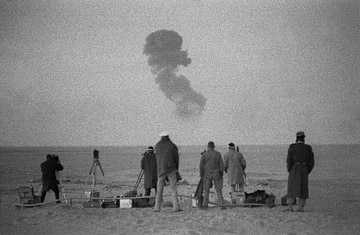
Raggane in the Algerian Sahara shows officials watching a French nuclear test during the 1960s
After nearly 40 years of denial, France is finally taking responsibility for the health consequences of its nuclear-testing program — although too late for those who died over the decades after having served France's strategic interests. On Tuesday, the French Parliament approved legislation providing care and compensation to people exposed to radiation during France's nuclear testing and who have fallen or may yet fall ill as a result.
The bill calls for the establishment of a review commission and fund dedicated to veterans and civil personnel who worked on the 210 nuclear-test explosions France carried out from 1960 to 1996. Those resources will also be available to people who claim they are suffering from radiation-caused illnesses because, at the time, they lived in the Algerian Sahara and near the two Polynesian atolls where France staged its underground, submarine and atmospheric blasts. The legislation — whose 300-to-23 passage spanned party lines — should breeze through both houses of Parliament in subsequent votes following Tuesday's initial test.
"Thirteen years after the end of the tests in the Pacific, the bill I am presenting today is to allow our country to serenely close a chapter of its history," Defense Minister Hervé Morin told the lower house on June 25, as he proposed the legislation for debate. "France showed its greatness in the political, strategic challenge that brought us into the very small circle of nuclear powers. It must show greatness in its determination to repair its mistakes."
But for many veterans, the term "mistake" is an insulting understatement. For nearly four decades, France's governments and its military refused to even consider whether the tests might have caused illnesses in people exposed to them. Official claims filed by victims were usually turned away, according to veteran groups and lawyers for radiation victims. Those determined enough to get a response to their claim were confounded by the authorities, who would not release any information about the tests on the grounds that they remained state secrets. Only around 20 veterans have ever managed to win symbolic damages from civil courts, which struggled to deliver justice in the face such official rigidity.
History has taught groups that represent people who have been exposed to radiation during French nuclear tests to be wary of any movement on the topic — and that suspicion remained strong going into Tuesday's vote. Despite its passage, Morin's text is only the latest of 18 similar plans introduced since 2002 that have outlined compensation for people exposed to the blasts. All of those previous plans eventually petered out. This time, Morin has minimized the number of victims he says will be covered by his bill as "several hundred" — an optimistic estimation, experts say, given the 150,000 people that independent studies calculate were exposed in various degrees to the explosions.
That's one reason veterans' groups remain on their guard. While they call France's official acknowledgment of responsibility for the consequences of nuclear testing a major breakthrough, they warn that the number of victims will reach into the tens of thousands or more. Because of that, they say Morin's initial compensation fund of $14 million will probably have to be increased to nearly $100 million. Those groups also argue that the commission to hear radiation claims — which will be composed of a judge and eight doctors — should also include veteran representatives. "The past has shown us that experts designated by the state on this have often been less than independent from politicians in their decisions, which is why we want our representatives present on the compensation commission," says Pierre Marhic, president of the National Association of Veterans Victim to Nuclear Tests — who blames his own lymphatic cancer on the 1968 atmospheric explosion he witnessed.
Given enough time — and pressure — that too may change. Veterans' groups intensively scrutinized the bill as it was being drafted and as a result won considerable concessions, including the shift of the burden of proof from the claimant to the government: now the state will have to prove radiation wasn't the cause of illness if it wants to avoid paying compensation, rather than victims having to establish the contrary before their claims are recognized. But Marhic says the proposal is still too restrictive on whom it will accept as sufficiently radiated by tests to apply for compensation. He and other veterans vow to lobby legislators who voted for the law while calling for its amendment in victims' favor.
Whatever its final form, once it becomes law, Morin's bill will set up for France a system not unlike that established by the U.S.'s Radiation Exposure Compensation Act of 1990, which has approved over $1.38 billion in health-care or damages payments so far. That could have the unintended benefit of increasing the pressure on Britain to drop its long-standing refusal to compensate people who claim they were radiated during the U.K.'s nuclear testing from 1952 to 1991. The eventual passage of the French bill will leave London as the only Western nuclear power without an official body to hear such cases.
A British High Court ruling earlier this month has already given around 1,000 veterans of the country's nuclear testing program the go-ahead to sue the government for radiation-linked illnesses. However, any of those cases that may eventually triumph in court will take years to hear and presumably even longer to wind through the appeals process — a stall tactic that French veterans have long accused France of employing. But with French nuclear-testing victims finally having some success in getting their state to do the right thing, their British peers might just pick up some useful tactics of their own.
